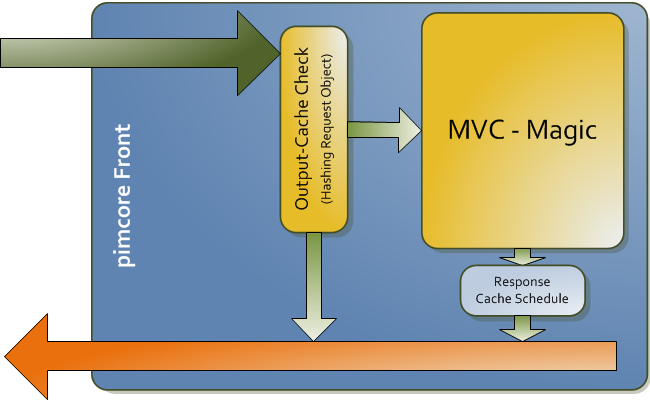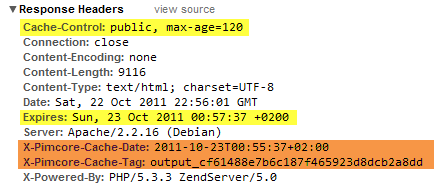Full Page Cache (Output Cache)
Overview
Configure the Full Page Cache
Please Note
The full page cache is disabled by default if you're logged in in the admin interface or in the case the debug mode ('APP_ENV=dev') is on.
The full page cache only works with GET request, it takes the whole response (only for the frontend) including the headers from a request and stores it into the cache. The next request to the same page (hostname and request-uri are used to build the checksum/hash identifier) will be served directly by the cache.
You can check if a request is served by the cache or not checking the response headers of the request. If there are X-Pimcore-Cache-??? (marked orange below) headers in the response they the page is coming directly from the cache, otherwise not.
If you have specified a lifetime, the response also contains the Cache-Control and the Expires header (perfect for HTTP accelerators like Varnish, ... ).
You can configure full page cache in config/config.yaml, as in e.g.:
# config/config.yaml
pimcore:
full_page_cache:
enabled: true
lifetime: 120
exclude_cookie: 'pimcore_admin_sid'
exclude_patterns: '@^/test/de@'
| Option | Description |
|---|---|
| Enable | Set to true to enable to full page cache. |
| Lifetime | You can optionally define a lifetime (in seconds) for the full page cache. If you don't do, the cache is evicted automatically when there is a modification in the Pimcore Backend UI. If there is a lifetime the item stays in the cache even when it is changed until the TTL is over. The lifetime is useful if you have embedded some items which are not directly in the cms, like rss feeds, or twitter messages over the API. It is also highly recommended to specify a lifetime on high traffic websites so that the frontend (caches) isn't affected by changes in the admin-UI. Otherwise on every change in the admin-UI the whole output-cache is flushed, what can have drastic effects to the server environment. |
| Exclude Patterns | You can define some exclude patterns where the cache doesn't affect. The patterns have to be valid regular expressions (including delimiters) and different patterns should be seperated by , |
| Disable Cookie | You can define an additional cookie-name which disables the cache. The cookie "pimcore_admin_sid" (used for the Pimcore admin UI) ALWAYS disables the output-cache to make editor's life easier ;-) |
Disable the Full Page Cache in your Code
Sometimes it is more useful to deactivate the full page cache directly in the code, for example when it's not possible to define an exclude-regex, or for similar reasons.
Disable caching via the response headers
Adding the Cache-Control: no-store header to your response will disable the full page cache as well as any other
middleware and browser caching:
<?php
$response->headers->addCacheControlDirective('no-store');
Disable the full page cache via an event listener
The full page cache can be disabled via an event listener on FullPageCacheEvents::CACHE_RESPONSE:
<?php
use Symfony\Component\EventDispatcher\Attribute\AsEventListener;
class DetermineFullPageCacheEventListener
{
#[AsEventListener(\Pimcore\Event\FullPageCacheEvents::CACHE_RESPONSE)]
public function determineFullPageCache(\Pimcore\Event\Cache\FullPage\CacheResponseEvent $event): void
{
$response = $event->getResponse();
if (true) { // Replace with your custom condition
$event->setCache(false);
}
}
}
Disable the full page cache listener entirely
You can obtain the full page cache service from the container and disable it, e.g. in a Controller via DI:
<?php
use Pimcore\Bundle\CoreBundle\EventListener\Frontend\FullPageCacheListener;
public function portalAction(Request $request, FullPageCacheListener $fullPageCacheListener)
{
$fullPageCacheListener->disable('Your disable reason');
return $this->redirect('de');
}
Disable the Full Page Cache via your request
Disable the Full Page Cache for a Single Request (only in DEBUG MODE)
Just add the parameter ?pimcore_outputfilters_disabled=true to the URL.
Disable the Full Page Cache with a Cookie and a Bookmarklet
Per default the disable-cookie configuration is set to pimcore_admin_sid.
That means that if you're logged into Pimcore (have a session-id cookie) you will always get the content live and not from the cache.
Bookmarklet
If you have the cookie pimcore_admin_sid in your system configuration you can use the following
bookmarklet to disable the full page cache without having an active admin session in another tab.
To use the bookmarklet, just drag the following Link into your bookmark toolbar (any browser):

